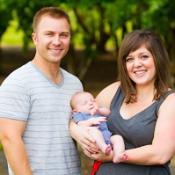 Many people may view young adulthood (defined here in the context of age, typically 18 to 25) as one of the most exciting times in a person’s life. Many young adults are graduating from high school and heading off to college—or graduating college and heading into employment. Some young adults are working full-time jobs and getting full-time paychecks for the first time.
Many people may view young adulthood (defined here in the context of age, typically 18 to 25) as one of the most exciting times in a person’s life. Many young adults are graduating from high school and heading off to college—or graduating college and heading into employment. Some young adults are working full-time jobs and getting full-time paychecks for the first time.
Numerous opportunities lie before these young, vibrant individuals. Some are moving out of their parents’ homes and experiencing a new-found freedom—no curfew, no one nagging them to do chores, etc. Young adults are often making their own rules, and more importantly, they are expected to make their own decisions.
Within the transition of “kid” to “adult” lies a multitude of variables that influence how a young person is defined, almost overnight. The change in how a young adult is described semantically (“kid” vs. “adult”) implies and may even dictate expectations. For example, “kids” are not necessarily expected to be employed and earn money to take care of themselves, whereas employment is expected by society for “adults.”
Society has an expectation that young adults graduating high school should have not only decided which college to attend (prior to graduating from high school), but should also have chosen their major, which may dictate the career/employment that will financially sustain them until retirement. Young adults may also feel the pressure or expectation of finding the “perfect” job—or at least one that will pay the rent. This is not so easy in today’s economy.Yes, the context of a young adult’s life can seemingly—and sometimes literally—change overnight. This change or transition can result in depression or increased anxiety expressed in the form of inability to make decisions or lack of motivation.
Although these new responsibilities and expectations are necessary in becoming a productive and self-sustaining individual, a degree of mindfulness and compassion for young adults should be practiced by parents, caretakers, and mentors. Society may sometimes take for granted that once an individual hits a certain age or reaches a certain milestone, such as high school or college graduation, he or she automatically gets this magical system upgrade and knows how to be an adult. While some individuals glide through this transition, others may have some difficulty.
So how can parents, caretakers, and mentors support this transition? Here are some tips:
- Acknowledge this important life transition. Don’t take it for granted.
- Give permission to make mistakes. Young adults are making important decisions about their futures for the first time, and they need to know they do not have to make perfect choices.
- Be a sounding board without judgment. Give advice only if advice is solicited. Though usually well-intentioned by the advice giver, sometimes the advice receiver can perceive it as doubt in his or her decisions.
- Step back and let young adults make choices and decisions, even if they appear stuck. If you make decisions for them, it may impede this new decision-making skill that is now required.
- Consider counseling. Having an outside third party to talk to may be beneficial for young adults who are expressing difficulty with the expectations of this life transition, especially if it is resulting in significant depression or anxiety.
Remember, even those who have been practicing adulthood for decades struggle from time to time. Mindfulness and gentle guidance are keys to support.

The preceding article was solely written by the author named above. Any views and opinions expressed are not necessarily shared by GoodTherapy.org. Questions or concerns about the preceding article can be directed to the author or posted as a comment below.

 There's No Perfect Time to Have a Child
There's No Perfect Time to Have a Child Off to College: Parental Separation Anxiety
Off to College: Parental Separation Anxiety Believing You Can Grow Helps You Grow
Believing You Can Grow Helps You Grow

Please fill out all required fields to submit your message.
Invalid Email Address.
Please confirm that you are human.
Leave a Comment
By commenting you acknowledge acceptance of GoodTherapy.org's Terms and Conditions of Use.